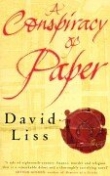BKMT READING GUIDES
Conspiracy of Paper
by David Liss
Paperback : 512 pages
1 club reading this now
0 members have read this book
Introduction
Benjamin Weaver is an outsider in eighteenth-century London: a Jew among Christians; a ruffian among aristocrats; a retired pugilist who, hired by London's gentry, travels through the criminal underworld in pursuit of debtors and thieves. In A CONSPIRACY OF PAPER, Weaver must investigate a crime of the most personal sort, involving the mysterious death of his estranged father, a notorious stockdealer. To find the answers, Weaver contends with a garrulous prostitute who knows too much about his past, estranged relatives who remind him of his alienation from the Jewish faith, and a group of powerful men in the world of finance who have disguised their business dealings with an intricate web of deception and violence. Relying on brains and brawn, Weaver uncovers the beginnings of a strange new economic order based on stock speculation - a way of life that poses great risk for investors, but real danger for Weaver and his family.
A fool and his money are soon parted--and nowhere so quickly as in the stock market, it would seem. In David Liss's ambitious first novel, A Conspiracy of Paper, the year is 1719 and the place London, where human greed, apparently, operated then in much the same manner as it does today. Liss focuses his intricate tale of murder, money, and conspiracy on Benjamin Weaver, ex-boxer, self-described "protector, guardian, bailiff, constable-for-hire, and thief-taker," and son of a Portuguese Jewish "stock-jobber." Weaver's father, from whom he has been estranged, has recently died, the victim of a horse-drawn carriage hit and run. Though his uncle has suggested that the accident wasn't quite so accidental, Benjamin doesn't give the idea much credence:
I blush to own I rewarded his efforts to seek my opinion with only a formal reply in which I dismissed his ideas as nonsensical. I did so in part because I did not wish to involve myself with my family and in part because I knew that my uncle, for reasons that eluded me, had loved my father and could not accept the senselessness of so random a death.But then Benjamin is hired by two different men to solve two seemingly unrelated cases. One client, Mr. Balfour, claims his own father's unexpected death "was made to look like self-murder so that a villain or villains could take his money with impunity," and even suggests there might be a link between Balfour senior's death and that of Weaver's father. His next customer is Sir Owen Nettleton, an aristocrat who is keen to recover some highly confidential papers that were stolen from him while he cavorted with a prostitute. Weaver takes on the first case with some reluctance, the second with more enthusiasm. In the end, both converge, leading him back to his family even as they take him deep into the underbelly of London's financial markets.
Liss seems right at home in the world he's created, whether describing the company manners of wealthy Jewish merchants at home or the inner workings of Exchange Alley--the 18th-century version of Wall Street. His London is a dank and filthy place, almost lawless but for the scant protection offered by such rogues as Jonathan Wilde, the sinister head of a gang of thieves who profits by selling back to their owners items stolen by his own men. Though better connected socially, the investors involved with the shady South Sea Company have equally larcenous hearts, and Liss does an admirable job of leading the reader through the intricacies of stock trading, bond selling, and insider trading with as little fuss, muss, and confusion as possible. What really makes the book come alive, however, are the details of 18th-century life--from the boxing matches our hero once participated in to the coffee houses, gin joints, and brothels where he trolls for clues. And then there is the matter of Weaver's Jewishness, the prejudices of the society he lives in, and his struggle to come to terms with his own ethnicity. A Conspiracy of Paper weaves all these themes together in a manner reminiscent of the long, gossipy novels of Henry Fielding and Laurence Stern. Indeed, Liss manages to suggest the prose style of those authors while keeping his own, less convoluted style. This is one conspiracy guaranteed to succeed. --Alix Wilber
Discussion Questions
No discussion questions at this time.Book Club Recommendations
Recommended to book clubs by 0 of 0 members.
Book Club HQ to over 90,000+ book clubs and ready to welcome yours.
Get free weekly updates on top club picks, book giveaways, author events and more








